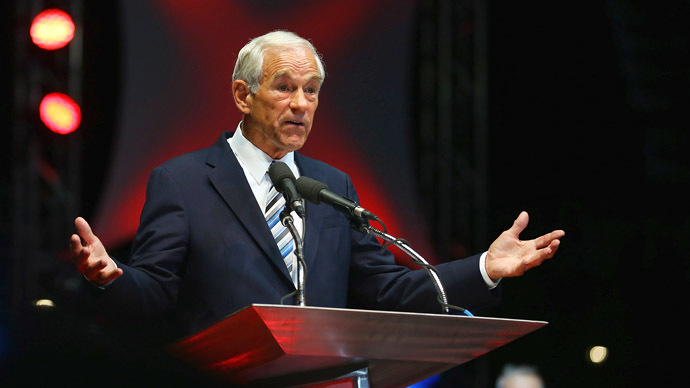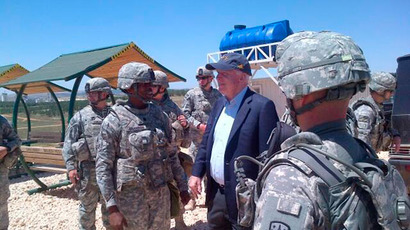Ron Paul: ‘Obama’s Syria policy looks a lot like Bush’s Iraq policy’

Did the White House’s remarks about Syrian President Bashar al-Assad using chemical weapons sound familiar? Former congressman Ron Paul says the build up to a likely strike on Syria reminds him of the days before the invasion of Iraq.
Paul, the longtime Republican lawmaker from Texas who retired last year following an unsuccessful attempt to gain the GOP nomination for the presidency, published a statement on his website this week criticizing the White House for their latest remarks regarding Syria.
US President Barack Obama said months ago that any proof of Assad using chemical weapons against Syrians would constitute the crossing of a “red line” that would spur American intervention. Last week, the White House said evidence linked Assad’s government to using chemical warfare to kill as many as 150 opposition fighters during the bloody civil war that has so far costs more than 90,000 Syrians their lives, according to United Nation estimates. Washington is now likely to begin arming Syrian rebel fighters and is pondering a possible no-fly zone over Syria.
According to Paul, the latest rhetoric from the White House is something he’s seen before.
“Because of this use of gas, the president claimed, Syria had crossed his ‘red line’ and the US must begin to arm the rebels fighting to overthrow the Syrian government,” Paul wrote. But at the same time, Paul called into question a previous report from the Washington Post, in which the paper cited White House officials as having decided “weeks ago” to arm Syrian rebels.
“[I]n other words, it was made at a time when the intelligence community did not believe ‘with high confidence’ that the Syrian government had used chemical weapons,” Paul said of that decision. “Further, this plan to transfer weapons to the Syrian rebels had become policy much earlier than that, as the Washington Post reported that the CIA had expanded over the past year its secret bases in Jordan to prepare for the transfer of weapons to the rebels in Syria.”
On his website, Paul wrote that things are starting to seem all too similar to what preceded the invasion of Baghdad in 2003.
“The process was identical to the massive deception campaign that led us into the Iraq War,” Paul claimed.
Just like under President George W. Bush, Paul said the Obama administration is “fixing the intelligence and facts” so it can justify an already determined policy.
“And Congress just goes along, just as they did the last time,” Paul wrote.
Congress has not formally decided how it will heed any calls to arm Syrian rebels just yet, but a number of influential politicians on the Hill have raised their voices already, particularly in light of the White House’s recent claim.
Sen. John McCain (R-Arizona), an outspoken supporter of the efforts to aid the rebels, said last week that the United States’ failure to act already in the civil war is “disgraceful.”
“For us to sit by, and watch these people being massacred, raped, tortured in the most terrible fashion, meanwhile, the Russians are all in, Hezbollah is all in, and we’re talking about giving them more light weapons? It’s insane,” he said. “Frankly, every day that goes by and we don’t get rid of Bashar Assad, it becomes more and more complicated and difficult.”
Indeed, even Pres. Obama has said that removing Assad from office has been a priority within Washington for quite some time now. But just as with a decade earlier, he’s already finding some opponents in Washington uninterested in opening up another war.
Speaking on CBS’ Face the Nation over the weekend, House Intelligence Chairman Mike Rogers (R-Michigan) equated the news coming out of the White House as a lot of huff.
"It seems to me they have a great media strategy," Rogers said. "They don't have a great Syrian strategy, and I don't believe any of our members - and we had both Republicans and Democrats on the committee - express concern about where they think we are today, and where we think the administration wants to go.”
"What is the plan? Where are we going in Syria? And what do you want to accomplish?" Rogers asked. "Some of the things that they've told us - told the Intelligence Committee - in the past doesn't comport with what they're presenting as the direction they want to go. So we've asked them to come up and say if we're going to move in this direction, you're going to have to come up with a more comprehensive plan."
"They've got a lot of explaining to do to come up and say, 'Here's our comprehensive plan on how we move forward on what is a catastrophic situation that's getting worse every single day in Syria,'" Rogers said.
Speaking to PBS host Charlie Rose in an interview that aired late Monday, Pres. Obama dismissed the claims from the likes of Mr. Paul that the unrest in Syria would spark another war for his administration to be entwined in.
"It is very easy to slip slide your way into deeper and deeper commitments," Obama told Rose, referring to the possibility of another war in the Middle East.
"Now, on the other side there are folks who say, you know, 'we are so scarred from Iraq. We should have learned our lesson. We should not have anything to do with it,'" Obama said. "Well, I reject that view as well because the fact of the matter is, is that we've got serious interests there."
"The goals are a stable, non-sectarian, representative Syrian government that is addressing the needs of its people through political processes and peaceful processes," added the president. "We're not taking sides in a religious war between Shi'a and Sunni. Really, what we're trying to do is take sides against extremists of all sorts and in favor of people who are in favor of moderation, tolerance, representative government - and, over the long-term, stability and prosperity for the people of Syria."
Mr. Obama is currently overseas discussing the Syrian situation with other world leaders, including Russian President Vladimir Putin. Alexei Pushkov, chairman of the Russian parliament’s International Affairs Committee, said in a tweet last week that the White House’s information about the usage of chemical weapons by the Assad regime “is fabricated in the same way as the lie about Hussein's weapons of mass destruction” in Iraq.














